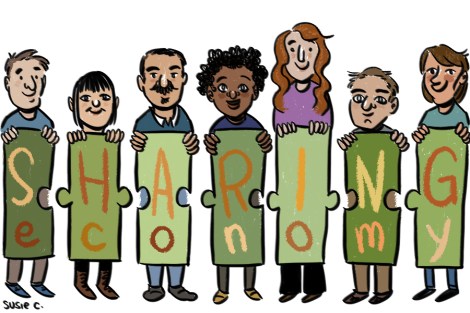
Susie Cagle
This thing we call “the sharing economy” — the messy, fascinating world of networked goods exchange, freecycling, carsharing, and beyond — is an unusual hybrid of normally warring sensibilities and belief systems.
It’s got enough touchy-feely-huggy utopianism to turn the stomach of any self-respecting contemporary skeptic. But it’s got enough market-economics pragmatism to raise the hackles of your typical leftie communitarian.
The sharing economy, in other words, cuts across our assumptions in intriguing ways. That’s one reason we’ve picked this subject as our January theme here at Grist. Another is that the sharing-economy vision offers one imaginable route around that big pileup on the road just ahead of us, where an out-of-control growth economy is slamming into the physics of climate.
Why is there so much buzz and innovation around sharing right now? Part of it is the limping economy, of course — the “real one,” the one that’s all what’s mine is mine. Part of it is a growing awareness that mindless consumption is a big ingredient in the recipe for our sweating climate. And then there’s technology.
The internet has always threatened/promised to remove comfortable middlemen and disrupt existing profit margins. The money newspapers lost on classified revenues when Craigslist came along was also money that ended up, fractionally, in all our pockets when we stopped having to pay cash to place our classifieds.
Rinse and repeat, industry by industry. You end up with a good number of happy Airbnb customers as well as a good number of unhappy hoteliers. Now the car-free population can connect with car owners whose vehicles are idle; they’re mostly pretty happy, but the taxi folks are steaming.
How can we square the ethos of sharing with a go-go internet startup culture that typically has at least one eye on IPOs and acquisitions? Are sharing and capitalism really at loggerheads, and if so, what could a “sharing business” possibly mean? Anybody got something good to trade for a set of drill bits? (I only used them once!)
Many of us are excited about the benefits, environmental and otherwise, of an economy that’s less hellbent on exploiting resources for profit and more mindful of ways to get fuller, fairer use out of the (mountains of) stuff we’ve already got. To get those benefits, we’re going to have to grapple with some of these tougher questions around sharing. So over the next couple of weeks we’ll dig into them here. (Susie Cagle’s nifty illustrated explainer is a good place to start.) We’ll also try to provide you with some helpful resources. In the spirit of this thing, we trust you’ll step up and share some of yours, too.




